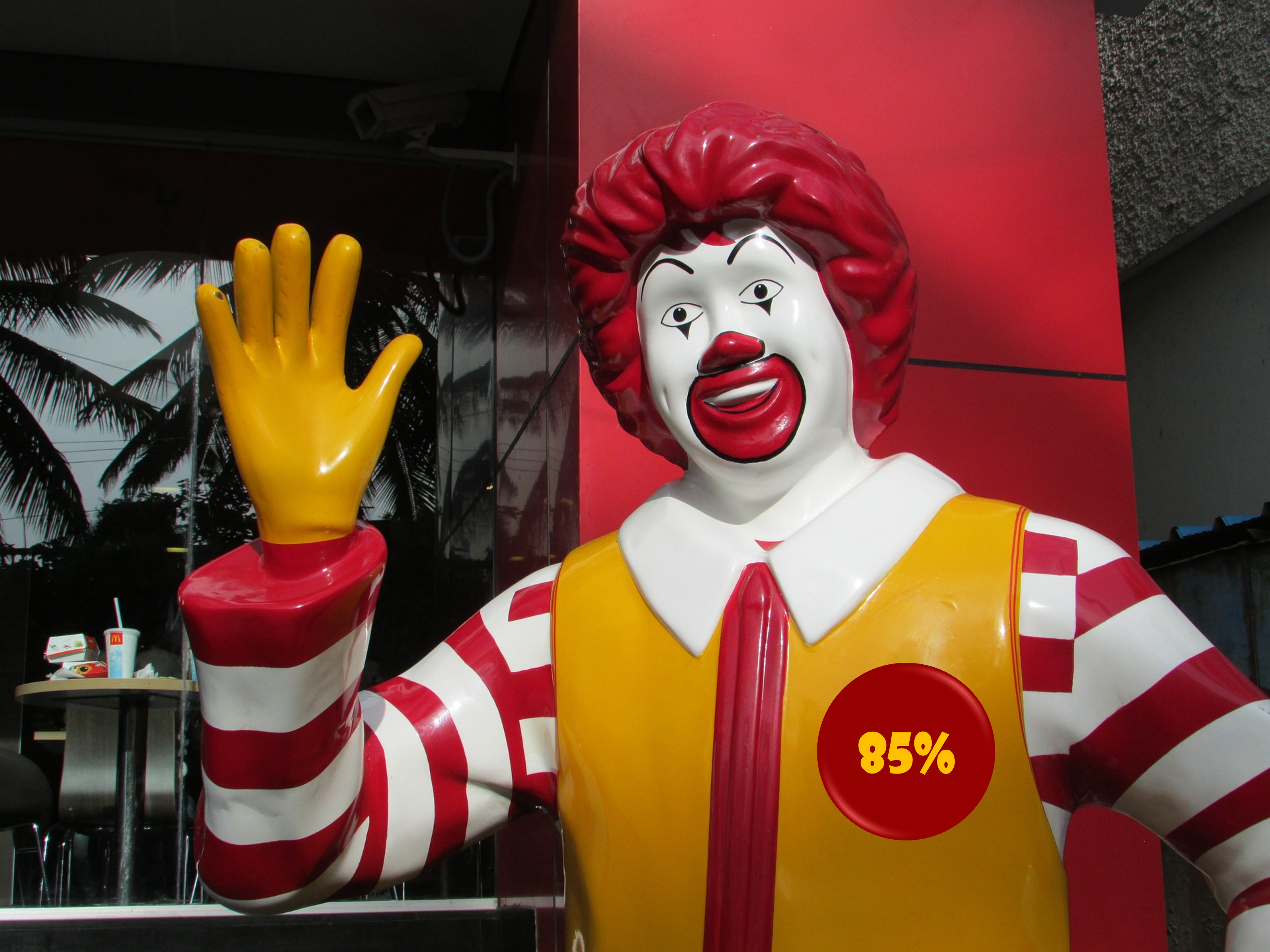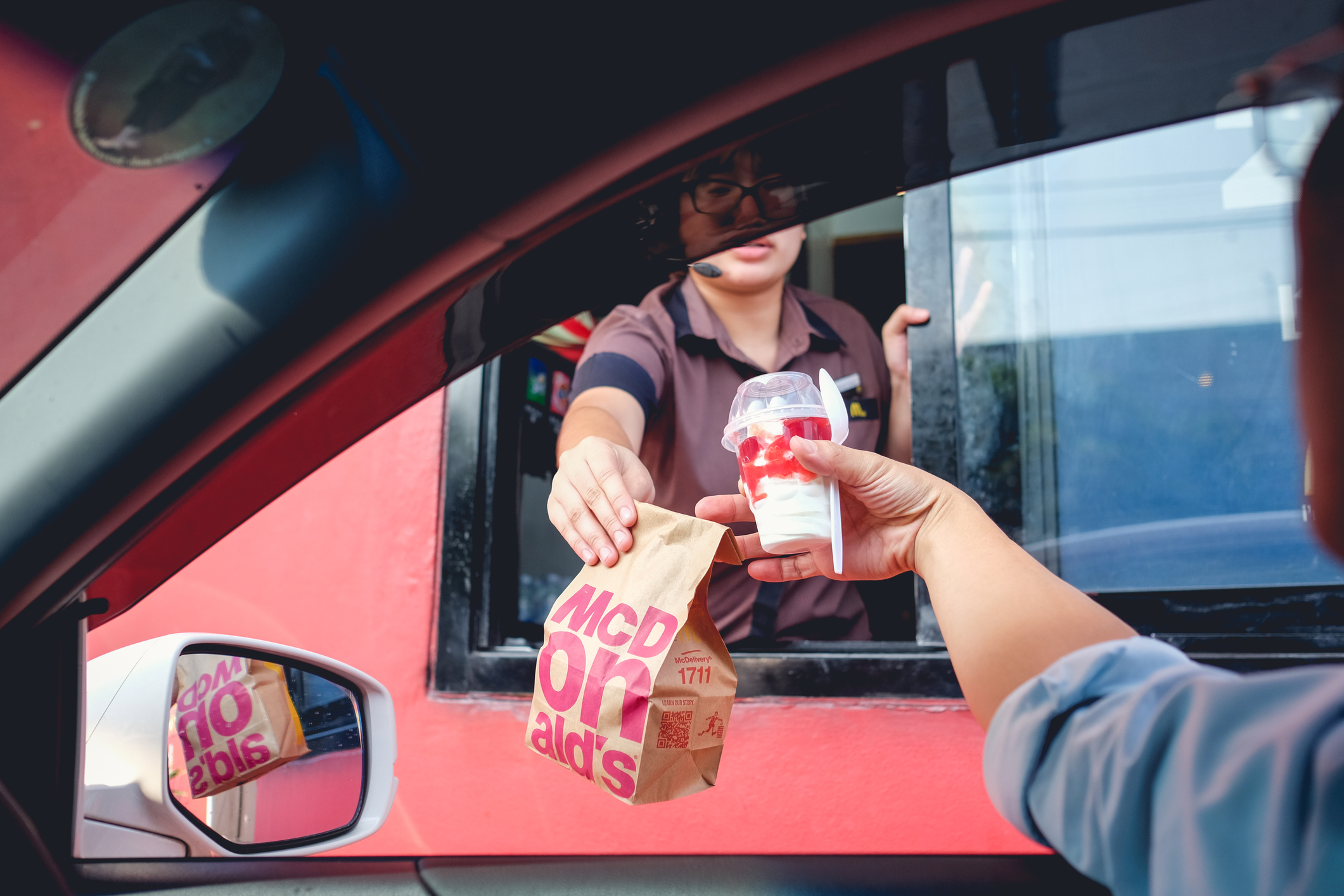
Welcome to the new week, radio people.
Over the weekend, I ran into a story in AdWeek that didn’t just resonate with me – it was like being wacked across the forehead with a Louisville Slugger. The subject is a new McDonald’s ad campaign that leans into the notion that while most Americans actually eat at one of their thousands of restaurants each year, it has become uncool to admit they do.
Despite the negative surrounding the fast food industry, what would you think is McDonald’s annual “cume” – the percentage of folks in the 50 states who buy some of their fast food at the Golden Arches at least once each year?
85%
That incredibly high level of penetration is the product of decades of creating consistently affordable and tasty food, regularly shaking up the menu, conjuring up special food items, and of course spending billions of dollars on research and mass marketing. Yet over time, especially as many people share the need to eat healthier, it has become de rigueur to claim you won’t go near Mickey D’s. After all, it’s fast food. 
And you can’t help but wonder if company meetings and advertiser pitches don’t end up sounding a lot like the way many radio CEOs stump speeches at the NAB sounded during the past many years:
“We’re an American icon. And let’s not forget – 85% of Americans still visit our restaurants each year!”
Meantime, those words are likely being met by eyerolls and yawns from both employees and clients, some of whom staunchly believe either those numbers are exaggerated or that even if they’re accurate, it is simply uncool to admit you eat at McDonald’s.
In Eastern Europe, McDonald’s ad agency is doing something about it. AdWeeek’s Stephen Lepitak reports that TBWA/Latvia has created a campaign that meets the “too cool” roadblock head-on.
The spots are focused on archetypes highly unlikely to be seen even in a McDonald’s drive-thru: a snobby intellectual, a chic fashionista, and a Goth hipster. The spots show how each struggles with resisting McDonald’s tasty offerings. And perhaps the campaign begins the process of reversing a perception that’s been rock solid.
Will this campaign make its way to North America? Clearly, that will depend on how effective it is overseas.
And what can radio broadcasters learn from its marketing strategy and messaging? It’s the kind of campaign that just might help radio here in the States improve its perception, clearly a step in the right direction.
That’s because radio broadcasters – especially commercial operators – are facing a similar problem. Many more people listen than care to admit it. “Cool” has always been an elusive quality to define, whether we’re talking about Bogart, Marilyn Monroe, David Bowie, or Pete Davidson.
I remember back in the 1980s a short-lived radio station in my hometown of Detroit, WDTX, attempted to market itself with this slogan:
“It’s cool and you know it.”
In many ways, the station was cool, but when you have to claim it, you’re not, as they no doubt discovered during their Roman candle run.
These days, radio isn’t deemed to be “cool” by most young consumers, and might be characterized as “uncool” by growing numbers of Americans of many ages.
You may have heard this story before, but it’s very telling, and a reminder that while the quality of what’s on the airwaves matters very much, radio’s perceptions in the ears of the beholder is up for grabs.
 In the summer of 2019, my wife and I toured Italy. One day we’re on a tour bus headed to a winery. We get to talking with a mom and her daughter from Seattle. The daughter is graduating from college – and I never do this – but I ask her if she listens to any local radio in the market. Our company had worked with Entercom since they bought their Seattle properties, and we were closely involved with KISW and KNDD (The End).
In the summer of 2019, my wife and I toured Italy. One day we’re on a tour bus headed to a winery. We get to talking with a mom and her daughter from Seattle. The daughter is graduating from college – and I never do this – but I ask her if she listens to any local radio in the market. Our company had worked with Entercom since they bought their Seattle properties, and we were closely involved with KISW and KNDD (The End).
So, I ask the question about radio, the daughter makes “the face,” and responds, “Not really, I mostly listen to Spotify.” Then after a pause, she admits, “Well, actually I listen every once in a while, mostly while I’m in the car. Sometimes, I listen to the alternative station in town.”
I respond, “The End?”
Now she’s leaning forward. I mention my company does work for the station, and the girl lights up. The conversation has suddenly taken a turn.
“I am a HUGE fan of their morning show, Gregr,” she tells me. “I love his stories about his dog, his mattress commercials, everything.”

I respond that I know Greg, and I might be able to arrange for her to meet him. Now, she’s over the moon.
You know the rest of the story. Of course, Gregr (pictured) is cool with this. He is perhaps the most listener-friendly personality I know, always willing to go that extra mile for fans. That’s who he is. That’s what he does. He is truly a great ambassador for KNDD – and for radio.
He’s not alone. Like the aroma of those Big Macs or the taste of those “golden fries,” they’re in our heads.
For many people, so is listening to the radio, in spite of its travails over the years. Despite the hard knocks and the self-inflicted wounds, radio is there when there’s an emergency, its talented personalities entertain every day, and radio continues to act as a friend and companion when people are feeling low, stressed, and hurting.
Will a simple ad campaign “fix” what’s ailing McDonald’s? Not likely. No more than it would provide the antidote radio needs to reestablish its cred as a mainstream entertainment medium.
But it is an acknowledgment the fast food giant is in need of a makeover, even as its food and healthier fare have improved.
No one eats at McDonald’s anymore.
And no one listens to the radio either.
Except that many do – and in droves.
Radio operators would be wise and prescient to pay attention.
Meantime, that Quarter Pounder and fries is sounding pretty good right about now.
- The Exponential Value of Nurturing Radio Superfans - April 28, 2025
- What To Do If Your Radio Station Goes Through A Midlife Crisis - April 25, 2025
- A 2020 Lesson?It Could All Be Gone In A Flash - April 24, 2025




Embrace being RADIO! Radio must support all the other media the industry has embraced – to the detriment of the THING ITSELF. RADIO is an amazing thing if it was allowed to be amazing. When you promote your website it should be in SUPPORT OF RADIO – same with newsletters, social media posts. STOP think radio isn’t radio. Love radio and others might just love it too. Make it great.
Thanks, Fred.
Thanks, Phil. Stay tuned for tomorrow’s post on a related note.
What is “The End” doing right? They have an actual human being interacting with listeners in real time, in the market, who’s willing to go out and interact on a personal level. It’s a local show, not a canned national show that “brings the blessings of major talent to you.” They’re putting real, relatable radio on the air and people are responding. Spotify doesn’t replace good radio. Spotify replaces your personal music collection. Stop being a jukebox and add value to the carefully curated music that you present. That’s what good radio does.
It’s a simple formula that’s worked for decades. It might cost more and require more management skills, but when it works, it’s what separates great stations from the also-rans. Thanks, Briaan.
Good point about making the station “real” to clients with anecdotes (like yours). We can prove listenership. I’m not sure it matters whether it’s acknowledged as cool, as much as our ability (or lack of) to prove effectiveness.
It’s going to be all about attribution. That’s where our friends at ad agencies are veering ever more toward digital. Nielsen is experimenting on the video side with attribution. If radio doesn’t somehow advance into this area it will be left to “what’s left of the budget”.
Fred, What a great read to start the week. Radio and real broadcasters are certainly alive and well. With less cash and more imagination, talent, information, excellent entertainment and comfort delivers local connection. The best IS yet to come. Radio conveys supreme audio. Do stay tuned!
Much appreciated, Clark.
Clark touches on one of the things I love most about radio–that imagination more than cash can really make all the difference. I love that the little guy on the block can sound as big and bad and bold as the biggest player in town–with the ratings to show for it. Man, when I think of some of the creative stuff we did in those production rooms to get “just” the right sound effects for this or that commercial or promo or contest, I think I could’ve had a second career as a foley artist! Unleash the creative talented brains and people WILL find–and love–radio again.
I have huge respect for those wizards in the production studio back in the day. As you note, Dave, there was more creativity flowing because there just wasn’t as much to do. Hard to believe most stations had their own “production person!”
A point to remember. That 85% McDonalds reports as their “cume” is going to include not only those who crave that Quarter Pounder but also anyone who perhaps finds it easier to get coffee from their drive-thru on the way to work than get caught in the long drive-thru line at Starbucks. Or a variety of other reasons beyond the usual presumptions.
I eat very little red meat and I have a digestive disorder that eliminates poultry from my menu, so about the only things on the Mickey D’s menu that I can have are fries, beverages, and desserts. And you know what? Sometimes I crave that heated apple pie of theirs and will swing by just to get it along with a vanilla shake. I guess that makes me something of a P3.
Just like those who sometimes crave a Big Mac or Chicken McNuggets but wouldn’t dare reveal their affinity for McDonalds, there are those listeners who won’t admit listening to radio — even a little (and if I correctly remember a Nielsen report that I read a few years back, the TSL of about fifteen P3s combined equals one P1) — and unless you’re in a PPM market those people are a lot less likely to record that listening accurately.
Those are the listeners that we have to excite enough for them to admit that yes, they are listening.
Great comment, KM. I owe you an apple pie & a vanilla shake.
Well, if radio really wants to be cool, how about a completely new innovation? Remember when “Silent Movies” were king, and all the movie producers thought people would always love silent movies, and nothing would ever change? And then came “The Jazz Singer,” the first talking movie. As creator and host of The Action Radio Citizen Legislature, I’m here to tell you that we are, The Jazz Singer, of radio, a completely interactive forum with a website where citizens can write and advocate the laws “We the People” consent to be governed by, and talk about it on the air.
As an example of how far this has gone, please check out this recent show with Christina Bobb, Trump attorney and reporter for OANN.
https://www.blogtalkradio.com/citizenaction/2023/01/26/action-radio-a-special-visit-with-christina-bobb-president-trumps-lawyer
Fred Jacobs, I would be honored to have you as my guest on the show sometime! Thank you!
Show site: BlogTalkRadio.com/citizenaction
Bill site: WriteYourLaws.com
Substack: GregPenglis.Substack.com
Be careful what you wish for, Greg. 🙂 Thanks for the update – sounds like you’re making progress.
I am careful. That’s why I wish for the greatest freedom for the greatest number, and that’s worldwide. I wish for a country that lives up to its founding principles. I wish for a time when “We the People” submit to government the laws that we consent to be governed by. And I wish for a time where laws cease flowing from the special interests, through government, to regulate the people, and laws flow from the people, through government, to regulate the special interests. Thank you for your reply, Fred. I appreciate it.
Great blog, very interesting.
Thanks, Josh.
Interesting that you brought this up.
Just a couple of days ago, Axios did a story on corporate rebranding.
Maybe radio is due for one?
https://www.axios.com/2023/01/26/the-rise-of-corporate-rebranding?stream=business
It’s like you’ve been sitting in our meetings. I had not seen the Axios piece (thank you). We have several examples in radio. (Maybe I should rebrand Jacobs Media?? 🙂 )
I remember doing a weight loss program. Every day at a certain time I would do a live original read about my day’s struggle with food, issues I faced, pounds I lost it was as if the listener didn’t view it as a commercial. They would see me at remotes and say I really like when you talk about your weight loss journey. I hate when I miss it. It was eye opening for me. Client revenue improved 35% during the campaign. When done right radio works
Yeah, there was a time when even Nutra System worked.
Thanks for sharing this story and very interesting point of view; I am hearing this from all fronts that people listen to the radio more for the news, traffic, and in your young listener, conversation aspect of it; so perhaps, we should rethink how radio provides a more dynamic environment for listeners…
That’s a big part of my thinking, Azita. Thanks for the note.
The year was 1982 as I pre sold advertising for my soon to be on the air small town Kansas radio station. I called on a mom and pop appliance store. Both mom and pop said they scarcely listened to the radio and they definitely didn’t pay any attention to any commercials when they did listen. As part of my pitch I asked them, if they did advertise with me, what type of commercial message would they like. They then proceeded to critique, both good and bad of a dozen or more current commercials running on area radio stations. After going through this lengthy discourse on the good and bad, they told me what they puke want and I sold them an annual contract and they were one of my more loyal advertisers.
I love this story. You have to stay with these people who listen more than they think.